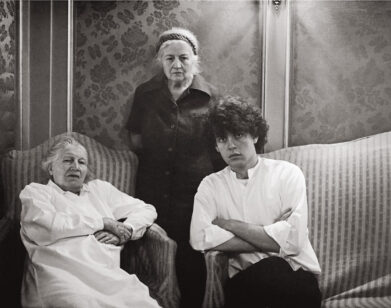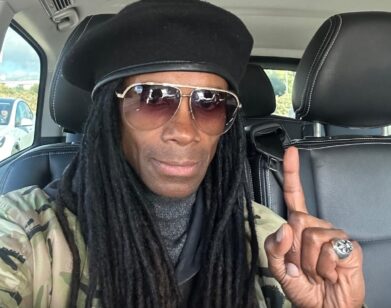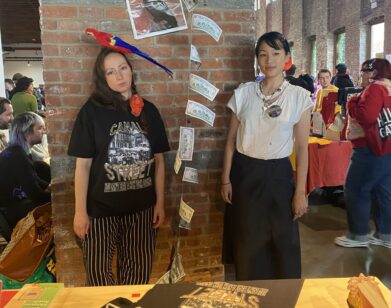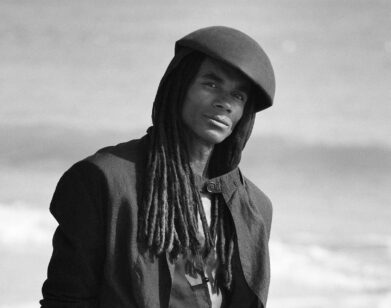Trinie Dalton Goes Around the World in 162 Pages
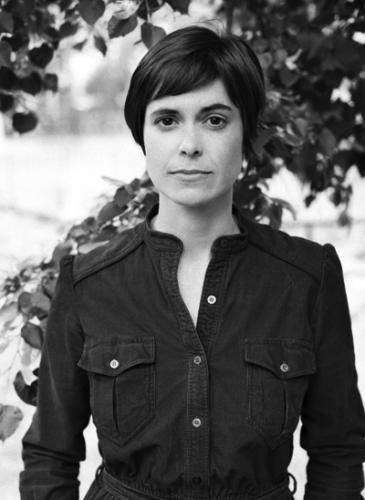
ABOVE: TRINIE DALTON. IMAGE COURTESY OF JASON FRANK ROTHENBERG
Vacations don’t always involve physical travel. In Trinie Dalton’s Baby Geisha (Two Dollar Radio), the author plays with fantasy and escape in trippy, travelogue-style short stories that stray from the jungles of Guatemala to Greek Islands. Sometimes the stories play out mostly in the narrator’s head and feel like brilliant sexual fairy tales on drugs. This romantic almost rock ‘n roll style has earned Dalton fans like Thurston Moore, and she is the first to admit that music greatly influences her work. Though for this exotic collection, Dalton jammed more to disco-inspired African beats coming out of the nightclubs of 1970s Lagos. From postcards exchanged between to would-be lovers looking to hook up, to one American’s misguided quest for spiritual enlightenment, Dalton writes of self-discovery and sex with a knowing humility and humor.
We spoke with Dalton about the influence of Eastern art and philosophy in her work, feeling like tourists in our own lives, sexual fantasies, the history of witchcraft, and why rural America can be terrifying.
ROYAL YOUNG: Sometimes it seems Americans are on a quest for enlightenment. We have this obsession with spiritual peace. How does our hunger for it change the shape of our search?
TRINIE DALTON: Yeah, I know. I keep thinking it’s tied into capitalism, because we’re so goal-oriented in this country. My stories are not trying to speak for America. They’re just ideas that have been circulating amongst my friends.
YOUNG: What were those ideas?
DALTON: Well, I guess even among the Arthur group of people, a few of us have gotten really interested in Eastern culture, Eastern spirituality. My husband and I would take constant road trips from LA to New York. The coast people have this fear of what’s in the middle of the country. I’ve been looking at a lot of Tantra paintings, and just wrote about it for Artforum. The idea that in that tradition, you just don’t go out and get what you want. That’s such a colonial attitude. I think a lot of us are bummed out because we have that worldview and don’t know how to lose it, that’s how we were raised. The idea that you can just go out and spend a weekend and get enlightened is a classic idea of the West.
YOUNG: There are many places in the book. South and Central America, Greece; how did place come into play?
DALTON: I’ve done a lot of traveling. The whole premise of this collection was for the stories to poke fun at the trips. Kind of silly. When you only spend a week or two in a place, you have these impressions of countries. You can’t know the place, if ever, until you’ve lived there.
YOUNG: Do you think it’s possible for us to feel that sense of tourism in our own lives?
DALTON: I feel that sense of tourism every day, all the time. I always feel voyeuristic. I like writing about sexual encounters where characters bring their expectations into the situation and then that imposes and influences the way it evolves.
YOUNG: How often do we project our own needs and wants, and when that doesn’t happen, get so frustrated?
DALTON: Yes, disillusioned, and we blame it on God and so many different things.
YOUNG: Yet, I find again and again that when I let things grow organically and don’t force opportunity, it is so much more rewarding.
DALTON: My experience of life is the same.
YOUNG: What about sex? How do our expectations play out in it and what is the difference between sexual fantasy and the everyday sexual interactions we have?
DALTON: I don’t know these days if I can really separate fantasy from reality. I think it overlaps sometimes. A lot of times in the book, when there’s a sexual fantasy happening, it sometimes comes to fruition with the characters, but often the fantasy is enough. I lead a pretty traditional life most of the time, sometimes not. But I think fantasy is pretty fulfilling in its own way, and sometimes it’s better to leave it as fantasy. I used to believe I had to live my life acting out every fantasy, otherwise I was some kind of poser.
YOUNG: Are drugs and sex and meditation and silence just different ways to lose or punish ourselves?
DALTON: The more I learn about meditation and sex is that it’s not supposed to be used just as an escape. It’s supposed to be a way to look at a larger picture. That goes back to American ideals and people wanting to find a quick answer, a direct path to happiness.
YOUNG: You use a lot of fairy tale [tropes]; specifically, I wanted to talk about this old woman beggar type we see over and over. The sort of bent crone.
DALTON: That comes from witchcraft. I’m really into witchcraft. The wise woman or medicine woman who knew the plants. That old woman archetype was turned into the witch and cast out of society, because they were pagans and nature worshippers.
YOUNG: What about struggling with a sense of selfishness over giving to someone who you find strange, frightening or repugnant? Do you think it’s important to overcome those things?
DALTON: Yeah, I do. The dilemma and conflict is giving. My characters oscillate between people who are searching for something and can’t find it, or they’re asked to endure trials they can’t handle.
YOUNG: If we could go back to this very coastal fear of rural America and how geography shapes story…
DALTON: I don’t know what the deal is with the coastal fear. I lived in Northern New Mexico for awhile. I love the Southwest. The way neighborhood and community works is just so different in a tiny town. The idea of being an insider or outsider in a community exists whether you’re in the biggest city or smallest town.
YOUNG: I heard recently someone saying that New York has this crazy hustle and work ethic because there are so many tall buildings. You’re constantly on the ground looking up. You just have this gut instinct to climb to the fucking top and fuck everyone on the way up.
DALTON: [laughs] Exactly.
YOUNG: Then in L.A., because it’s more spread out and often you’re viewing you’re viewing your world through the windshield of a car, that can be similar to a movie screen.
DALTON: I definitely think cities have character like that, we would call the geography of the city. I love both and the fun thing about traveling is you get to see how people are influenced by their environment. That’s why my characters traveled so much. Next I’d like to go somewhere and write a whole book, immersed in one place.
BABY GEISHA IS OUT NOW.

